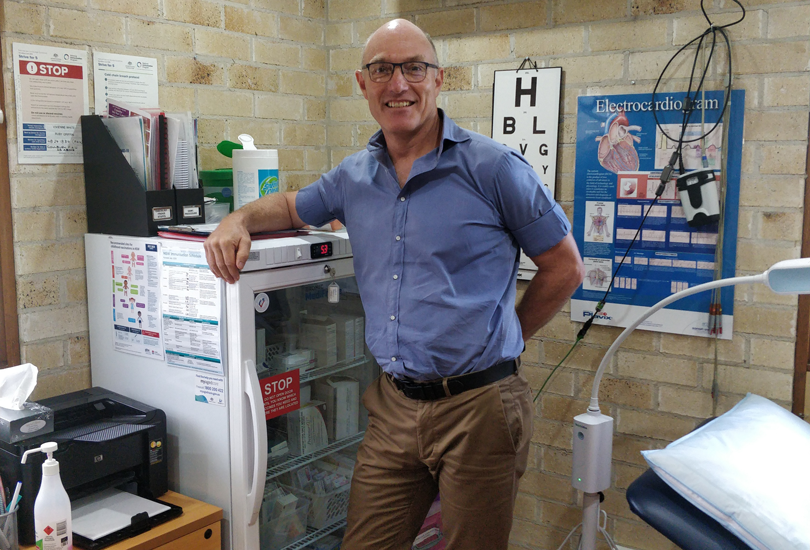
Dr Neil Starmer from Queen Street Medical Centre is investing in a $18,000 battery to ensure vital vaccines remain in cool storage during a blackout. Photo: Supplied.
A Moruya doctor estimates thousands of dollars worth of refrigerated vaccines have been lost during frequent and widespread power outages in the area.
Queen Street Medical Centre co-owner Dr Neil Starmer says $5000 worth of vaccines purchased by the practice and $15,000 worth of vaccines supplied by NSW Health were lost during power outages throughout the 2019-2020 Black Summer bushfires.
That’s why he’s investing at least $18,000 of bushfire insurance money into a battery that will keep the fridges at the Queen Street Medical Centres in Moruya and Broulee switched on during future blackouts.
“It’s a lot of money, but I’m sure we’ve wasted more on vaccines in the past five years,” says Dr Starmer.
Just last week, more vaccines were spoiled at the Broulee practice during a power outage caused by a possum damaging electrical equipment.
Dr Starmer is particularly concerned about losing any COVID-19 vaccines, which are due to arrive at the practice on 19 April.
To put things into perspective, Queen Street Medical Centre will need about 20,000 COVID-19 vaccines for its 10,000 active patients, and is already storing 2000 flu vaccines.
“We’ll be carrying a lot of vaccines, which will be very valuable, and I just don’t feel I can look after them properly unless the power is secure,” says Dr Starmer.
“We’re vulnerable to trees falling on powerlines, fires and other weather events in this area. When we first arrived here a couple of decades ago we had quite frequent power outages.”
In a bid to avoid disruption eight years ago, Dr Starmer and his business partners installed a 20-kilowatt grid connect and five-kilowatt standalone solar system on the Moruya practice’s roof.
However, the battery that stores power from the solar panels can only power the fridges for about two hours and power outages in the area can last for a whole day or night.
The insurance money will fund a larger battery for the Moruya practice so the existing battery can be moved to the Broulee practice.
However, Dr Starmer argues the government should invest in a community battery.
“I think a battery with the capacity to power the CBD of a town such as ours would add greatly to the security of our energy supply and could draw on the large amounts of solar energy that’s produced locally during the day,” he says.
“There’s a real lack of planning and such an opportunity. We need leadership.”
Dr Starmer has transported vaccines in an esky to Moruya Hospital during previous blackouts, but says that’s not possible anymore.
“You can’t put them in an esky and take them to the hospital without breaching the cold-chain requirement,” he says. “I’ve tried to do that and it’s very difficult.
“Or I have to come down with a generator and charge the batteries, but Murphy’s Law dictates that the power outage is in the middle of the night when I don’t know about it.”
Both the Pfizer and AstraZeneca vaccines that protect against COVID-19 need to be refrigerated and Dr Starmer says it’s up to each medical practice to provide the correct facilities.
“It’s left up to us,” he says. “We have to have monitors in the fridges, the fridges have to be registered with the public health unit, and we have to be able to supply our data loggers to prove the cold-chain is maintained.
“So the rules are quite strict, but there’s no specific funding for fridges or other things to maintain the storage of vaccines.
“We can’t be the only surgery to lose vaccines through power outages, and when we get the COVID-19 vaccine, it would be an epic fail if they went to waste like that.”
Jane Taylor from Narooma’s Lighthouse Surgery, where Covid-19 vaccines are being administered, said the practice has a generator that keeps the fridges going through blackouts.
“We’ve had the generator for quite a while and it was able to keep the fridges switched on during the 2019/20 bushfires,” she said.
Eurobodalla’s local emergency management officer and Eurobodalla Shire Council’s director of infrastructure Warren Sharpe said the council had asked for government assistance.
“The council advocated for further investment in the resilience of power supply in its submissions to the NSW Bushfire Inquiry and Royal Commission by the NSW and Australian Governments,” he said.
“We have also worked with Essential Energy to encourage more resilient power supply installations, particularly to critical community infrastructure such as telecommunications towers, water supply, and sewage systems.”







